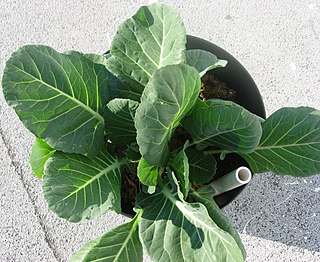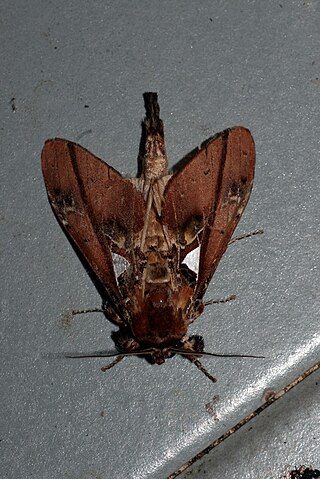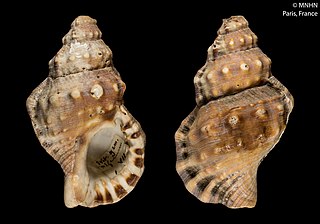
The Brussels sprout is a member of the Gemmifera cultivar group of cabbages, grown for its edible buds.

A botanical name is a formal scientific name conforming to the International Code of Nomenclature for algae, fungi, and plants (ICN) and, if it concerns a plant cultigen, the additional cultivar or Group epithets must conform to the International Code of Nomenclature for Cultivated Plants (ICNCP). The code of nomenclature covers "all organisms traditionally treated as algae, fungi, or plants, whether fossil or non-fossil, including blue-green algae (Cyanobacteria), chytrids, oomycetes, slime moulds and photosynthetic protists with their taxonomically related non-photosynthetic groups ."

The acephala group refers to any type of Brassica which grows without the central 'head' typical of many varieties of cabbage. These are included within the species Brassica oleracea, such as kale. The name literally means "without a head" in contrast to those varieties known as capitata or "with a head". This group includes a number of species, both wild and cultivated, many of which are grown for their edible leaves and flowers.

Coscinasterias is a genus of sea stars of the family Asteriidae.

Pygaerinae is a subfamily of the moth family Notodontidae, the silver prominents and relatives. The genus list is preliminary, as not all Notodontidae have been assigned to subfamilies yet.
Dialithis is a monotypic moth genus of the family Erebidae. Its only species, Dialithis gemmifera, is found in America. Both the genus and the species were first described by Jacob Hübner, the genus in 1821 and the species in 1823.
Atrichantha is a genus of flowering plants in the family Asteraceae.

Ginshachia bronacha is a moth of the family Notodontidae. It is found on Java, Thailand, Peninsular Malaysia, Sumatra and Borneo.

Ranella gemmifera is a species of predatory sea snail, a marine gastropod mollusk in the family Ranellidae, the triton snails, triton shells or tritons.

Karana gemmifera is a species of moth of the family Noctuidae. It is found in India and Taiwan.

Anthene gemmifera, the jewelled ciliate blue, is a butterfly in the family Lycaenidae. It is found in Sierra Leone, Ghana, Cameroon, Ethiopia, Uganda, south-western Kenya and along the coast, Tanzania and Zambia. The habitat consists of the forest/savanna transition zone and deciduous woodland.
Macrohastina gemmifera is a moth in the family Geometridae first described by Frederic Moore in 1868. It is found in India, Nepal and China.
Gymnelia gemmifera is a moth of the subfamily Arctiinae. It was described by Francis Walker in 1854. It is found in Venezuela.

Acropora gemmifera is a species of acroporid coral found in the Gulf of Aden, the Red Sea, the central Indo-Pacific, the southwest and northern Indian Ocean, southeastern Asia, Australia, the East China Sea, Japan, the oceanic central and western Pacific Ocean, and northwestern Hawaiʻi. It occurs on exposed upper reef flats and slopes, from depths of 1–15 m. It was described by Brook in 1892.

Acropora globiceps is a species of acroporid coral found in the oceanic central and western Pacific Ocean and central Indo-Pacific. It can also be found in the Great Barrier Reef, the Philippines, the Andaman Islands, Polynesia, Micronesia and the Pitcairn Islands. It occurs on the slopes of reefs, the flats of reefs, in tropical shallow reefs, and at depths of around 8 metres (26 ft). It was described by James Dwight Dana in 1846.

Tectaria gemmifera, the snail fern, is a species of fern in the family Tectariaceae. It is native to Africa from the equator southwards, and is present in the DRC, Uganda, Kenya, Tanzania, Rwanda, Burundi, Angola, Zambia, Malawi, Mozambique, Zimbabwe, South Africa and Madagascar. Its natural habitat is deeply shaded forest floors of moist subtropical or tropical forest, and it occurs from 600 to 2,550 metres above sea level. The Latin name refers to the gemma that are produced by the fronds of this species.
Janibacter corallicola is a species of Gram positive, strictly aerobic, bacterium. The species was initially isolated from coral in Palau in 2002. The species was first described in 2007, and the species name refers to its original isolation from coral.

Ginshachia is a genus of moths belonging to the family Notodontidae.

Diplosoma is a genus of tunicates belonging to the family Didemnidae.













